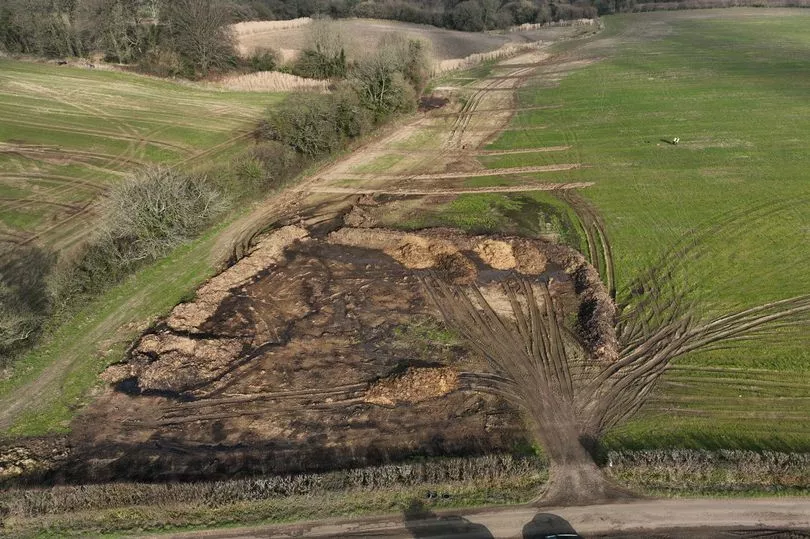
Dairy farmer fined $19K after illegal slurry dam collapse contaminates drinking water. How did this environmental disaster unfold and what are the implications for farming?
Imagine waking up to find your local river contaminated with a thick, toxic slurry. That’s exactly what happened in Devon, resulting from an unconventional ‘slurry dam’ built by a long-time farmer. This unexpected event led to severe consequences for the farmer and amplified concerns about sustainable dairy farming practices. The incident has sparked a comprehensive discussion on the responsibilities that come with modern farming and the dire need for stringent environmental safeguards.
A Costly Mistake: Dairy Farmer Fined for Slurry Dam Collapse
A 74-year-old mixed farmer from England’s South West has been ordered to pay total costs of £15,388.40 (around $19,300) plus a surcharge of £114 ($143) and complete 60 hours of unpaid community work after an illegal slurry ‘dam’ he built collapsed, causing widespread contamination.
The Environment Agency brought the case, which was first called to reports of pollution of the River Isle tributary in Devon in January 2023. The pollution was traced back to a slurry store made from farmyard manure that had collapsed, resulting in the entire store’s contents pouring out.
“In over 30 years of regulating farms, I have never seen such extensive contamination by slurry,” said senior environment officer Dave Womack.
In a court hearing on May 10 in the Exeter Magistrates Court, farmer Derek Dyer of Crawley Farm near Honiton pleaded guilty to one charge of causing pollution and two charges related to building an illegal slurry store.
- Penalty: £15,388.40 (approximately $19,300)
- Surcharge: £114 ($143)
- Community work: 60 hours of unpaid service
The collapse of the slurry dam resulted in widespread contamination. The slurry flowed 400 meters from the store location into nearby fields and a wooded area. The impact was severe, contaminating springs that supplied drinking water to several properties on a nearby estate, leaving residents’ water tainted with E. coli.
Courtroom Drama: Farmer’s Reckless Actions Exposed
In a court hearing on May 10 at the Exeter Magistrates Court, farmer Derek Dyer of Crawley Farm near Honiton pleaded guilty to one charge of causing pollution and two charges related to building an illegal slurry store. Dyer admitted he and his son used the field for the slurry store due to insufficient storage and delays in obtaining approval for a new store. He explained he believed the structure would hold until the slurry could be spread, but heavy rainfall led to its collapse.
District Judge Smith described Dyer’s actions as reckless, emphasizing that given his experience, he should have known better. The judge pointed out that Dyer’s family had farmed in the area for four generations, and such extensive contamination by slurry was unprecedented. Senior environment officer Dave Womack echoed this sentiment: “In over 30 years of regulating farms, I have never seen such extensive contamination by slurry.” Womack highlighted Dyer’s disregard for the law and stressed the importance of adhering to established regulations to prevent such catastrophic events.
The Environmental Toll: Slurry Mishandling in Dairy Farming
In over 30 years of regulating farms, senior environment officer Dave Womack stated, “I have never seen such extensive contamination by slurry.” This incident is not isolated; nearly 7 in 10 England-based dairy farms inspected by the Environment Agency between 2020 and 2021 breached environmental regulations. Specifically, dairy farming has been identified as the largest cause of agricultural pollution, majorly due to the mishandling of slurry.
Reacting to these findings, Paul Tompkins, chair of the NFU dairy board, emphasized, “The industry will continue its huge efforts to improve water quality through a range of best practice measures such as careful management and storage of fertilizer and manure.” He also mentioned the necessity of greater access to government schemes and a reduction in planning restrictions, which could aid dairy producers in better-managing slurry and protecting watercourses.
Industry Efforts and Best Practices in Improving Water Quality
The dairy industry has been actively pursuing a range of best practice measures to enhance water quality. These include careful management and storage of fertilizer and manure, which are essential to preventing further pollution incidents. Such efforts are critical given the significant role that slurry mishandling has played in past contamination events.
- Importance of Infrastructure Investment
Investing in on-farm infrastructure is vital to reduce pollution risks. Enhanced storage facilities for slurry and manure must meet regulatory standards and effectively protect watercourses. Modern, resilient infrastructure ensures that farms can handle the volumes of waste generated without risking environmental contamination. - Government Schemes and Grants
Access to government schemes and grants is also paramount. Programs like the Slurry Infrastructure Grant provide essential funding, enabling farmers to expand their storage capacity and make necessary improvements. Such support simplifies compliance with environmental regulations, further safeguarding water quality.
Comprehensive Guidelines for Slurry Storage Construction
Building a slurry store in the UK involves navigating a set of stringent regulations designed to protect the environment and local communities. These regulations encompass everything from planning permissions to specific location requirements and notifications.
Planning Permissions and Development Rights
Before you can begin construction, obtaining the necessary planning permissions and development rights is crucial. In many cases, full planning permission is required; even if it isn’t, the local planning authority must be informed about the construction plans. This step ensures that the proposed structure meets all safety and environmental standards.
“In England, the Environment Agency must also be notified at least 14 days before a new store is built or modified.”
Requirements for Location and Reporting
Choosing the right location for your slurry store is essential. There are specific rules to follow to minimize the risk of contamination:
- Ensure the store is placed at a safe distance from inland or coastal waters and land drains.
- Avoid building in flood-prone areas to reduce the risk of catastrophic spills.
- Maintain a minimum distance of 50 meters from wells and springs used for food production or drinking water.
Specific Rules for Conservation and Protected Areas
Additional regulations apply if your slurry store is near conservation or protected areas. These rules are more stringent to safeguard sensitive environments and biodiversity. Always check with local authorities to ensure compliance and avoid any legal repercussions.
The Bottom Line
This case highlights the critical importance of adhering to environmental regulations and best practices in dairy farming. It’s a stark reminder that the repercussions of neglecting these guidelines can be devastating financially and environmentally. The efforts by both regulatory bodies and the farming community to improve infrastructure and management practices are steps in the right direction. However, continuous collaboration and strict adherence to regulatory standards are essential to safeguarding water quality and ensuring sustainable farming practices. As a dairy farmer or anyone involved in agricultural activities, understanding and implementing these guidelines is not just a legal obligation but a moral one to protect our natural resources and communities.
Takeaway: This incident underscores the critical role of compliance with environmental regulations in dairy farming. It’s a reminder that both financial and ecological well-being depend on diligent adherence to best practices. Continuous collaboration between farmers and regulatory bodies, along with investment in infrastructure, is vital for safeguarding water quality and ensuring sustainable practices. For those in the agriculture sector, prioritizing these standards is a legal requirement and a moral responsibility to protect our shared natural resources and communities.











